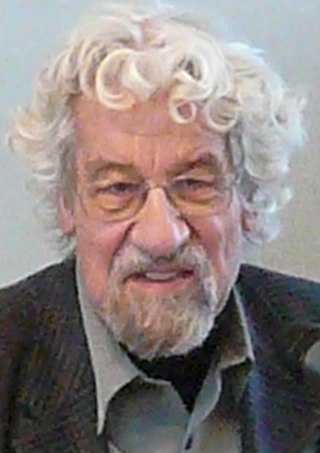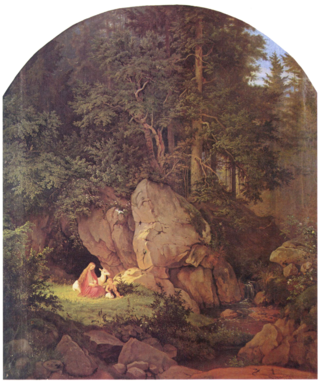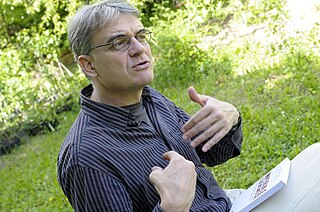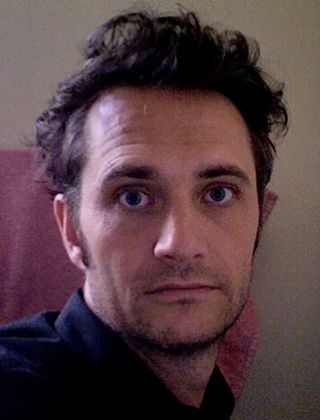Related Research Articles

Hans-Peter Dürr was a German physicist. He worked on nuclear and quantum physics, elementary particles and gravitation, epistemology, and philosophy, and he advocated responsible scientific and energy policies. In 1987, he was awarded the Right Livelihood Award for "his profound critique of the Strategic Defense Initiative (SDI) and his work to convert high technology to peaceful uses."
Gerhard Scherhorn was a German Professor and economist.
Neue Marx-Lektüre or NML is a revival and interpretation of Karl Marx's critique of political economy, which originated during the mid-1960s in both Western and Eastern Europe and opposed both Marxist–Leninist and social democratic interpretations of Marx. Neue Marx-Lektüre covers a loose group of authors primarily from German-speaking countries who reject certain historicizing and empiricist interpretations of Marx's analysis of economic forms, many of which are argued to spring from Friedrich Engels role in the early Marxist workers' movement.
Economy for the Common Good (ECG) is a global social movement that advocates an alternative economic model, which is beneficial to people, the planet and future generations. The common good economy puts the common good, cooperation and community in the foreground. Human dignity, solidarity, ecological sustainability, social justice and democratic participation are also described as values of the common good economy. The movement behind the model started off in Austria, Bavaria and South Tyrol in 2010 and quickly spread to many countries throughout the EU. It now has active groups in Africa, Latin America, North America and Asia. As of 2021, the movement consists of over 11,000 supporters, 180 local chapters and 35 associations.

Niko Paech is a German economist. Since 2018, he has worked as a supernumerary ("außerplanmäßiger") professor at the University of Siegen. From 2010 to 2018, he was substitute professor at the chair of production and environment (PUM) at the University of Oldenburg. His research focuses on the fields of environmental economics, ecological economics and sustainability.

Volker Hauff is a German politician of the Social Democratic Party (SPD).
Vereinigung für Ökologische Ökonomie (VÖÖ) is a German scientific society promoting ecological principles in the global economy.

The German Forest was a phrase used both as a metaphor as well as to describe in exaggerated terms an idyllic landscape in German poems, fairy tales and legends of the early 19th-century Romantic period. Historical and cultural discourses declared it as the symbol of Germanic-German art and culture, or as in the case of Heinrich Heine or Madame de Staël, as a counter-image of French urbanity. It was also used with reference to historical or legendary events in German forests, such as Tacitus' description of the Battle of the Teutoburg Forest or even the nature mysticism of the stylized Germanic national myth, the Nibelungenlied as the history of its multi-faceted reception shows.
Irene H. Schöne has a PhD in politics and economics and has spent a career working in environmental economics, as well as writing and speaking on these issues.

Eva Altmann was a German economist who in 1950 became the first rector of the new Academy for Economic Planning , as the institution was known before 1956.

Ulrich Brand is a German political scientist. Since September 2007 he has been a professor of International Politics at the University of Vienna.

Karl-Werner Schulte is a German Professor of Real Estate at the IREBS International Real Estate Business School, University of Regensburg and was Founder and Academic Director of the IREBS Real Estate Academy, formerly EBS Real Estate Academy.

Andreas Weber is a German biologist, biosemiotician, philosopher and journalist.
Ulrike Knobloch, is a German economist at the University of Vechta. Knobloch deals with gender science topics for theoretical economics that takes in real-world problems in social systems.
Claudia von Werlhof is a German sociologist and political scientist. She held the first professorship for women's studies in Austria, based at the Institute for Political Science at the University of Innsbruck.

Growth imperative is a term in economic theory regarding a possible necessity of economic growth. On the micro level, it describes mechanisms that force firms or consumers (households) to increase revenues or consumption to not endanger their income. On the macro level, a political growth imperative exists if economic growth is necessary to avoid economic and social instability or to retain democratic legitimacy, so that other political goals such as climate change mitigation or a reduction of inequality are subordinated to growth policies.
Professor Hans-Erich Volkmann is a German historian, whose works primarily deal with the history of Germany from the 19th–20th century, and particularly how it relates to the East European states. He is most notable for being one of the authors of the first volume of Germany and the Second World War. He has also been one of the editors of Militärgeschichtliche Zeitschrift.
Maximilian Becker is a German economist and politician who is a member of Die Linke.

Matthias Herbert Hartmann was a German Professor of Business Administration and the Dean of the Department of Economics and Law at the Hochschule für Technik und Wirtschaft Berlin. As an expert for innovation and technology management, he worked as a business consultant. In his function as staff officer of the reserves, he was a consultant in Germany's Federal Ministry of Defense.
Luisa Heese in Göttingen, Lower Saxony), is a German curator and director of the Museum im Kulturspeicher in Würzburg since September 2020. On July 1, 2023, Luisa Heese will leave the museum for the Kunsthalle Mannheim as curator of contemporary art and sculpture.
References
- 1 2 3 4 Eva Lang; Christiane Busch-Lüty; Jürgen Kopfmüller, eds. (2007), Wiedervorlage dringend: Ansätze für eine Ökonomie der Nachhaltigkeit (in German), München: oekom, p. 184, ISBN 978-3-86581-070-0
- ↑ Vorstand der VÖÖ. voeoe.de, accessed February 24, 2015.
- ↑ Kuratorium, buergerstiftung-muenchen.de, accessed February 24, 2015.